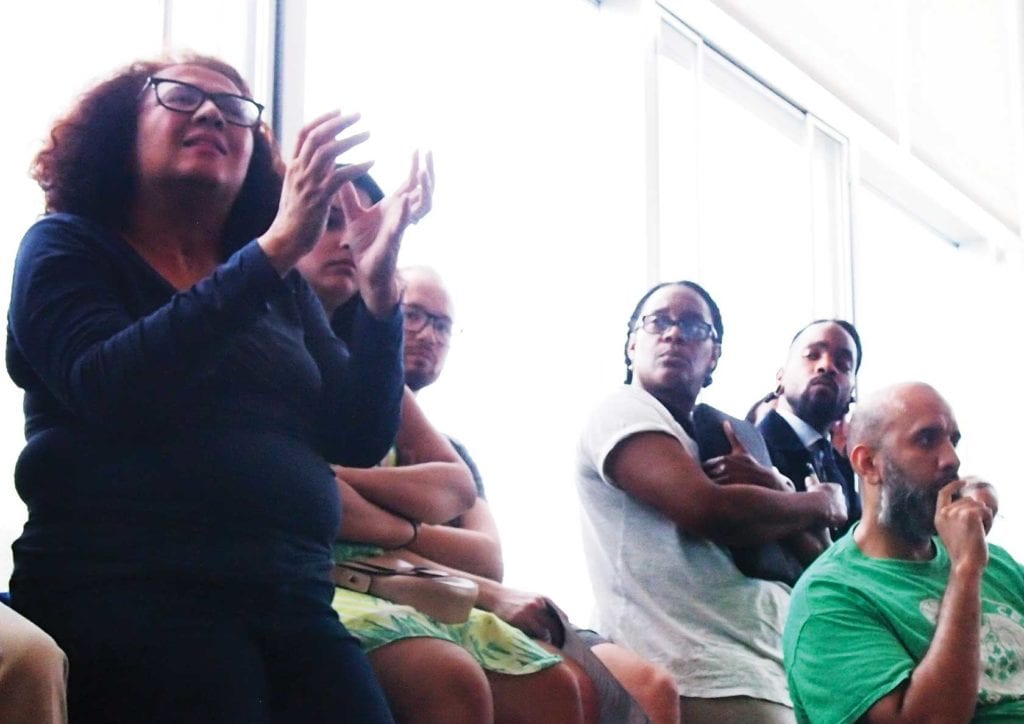Roxbury abutters say no to high-density studio units
Development plan calls for 21 units with affordable rents

When Gerard McGough sought to redevelop 176 Humboldt Avenue, a dilapidated former nursing home, he designed what neighborhood residents wanted, he said: market-rate two-bedroom condos.
The units, now selling in the $550,000 range, are out of reach of many current Roxbury residents.

Architect Derek Rubinoff addresses abutters during a meeting on the development of 124-126 Warren Street. Banner Photo
With 124-126 Warren Street, McGough is taking a different tack: 21 studio units, 17 of which will have rents in the neighborhood of $1,200 a month and four of which will be deeded affordable, renting for $950.
“By making the units smaller, it makes them affordable,” he said. “This is the new trend. All I’ve built is market rate. But it’s not good for the neighborhood. No one can afford it.”
Abutters of the 5,100-square-foot parcel, which stands at the corner of Warren and Winthrop Streets — opposite the Boys & Girls Club — expressed opposition to the project during a meeting on Monday at the Area B2 Boston Police Department substation. They objected to the size of the proposed five-story building and its density.
Architect Derek Rubinoff showed slides of similarly-sized three- and four-story brick apartment buildings on Warren Street.
McGough explained that the studio apartments would be restricted to single occupants and would attract younger renters who don’t own cars.
“This is the trend,” he said. “Young people don’t want 1,500-square-foot units with heating bills and everything that comes with it.”
The building would have a bicycle room and five enclosed parking spaces on-site, including one handicapped space.
Winthrop Street resident Sophia Transtamar questioned whether McGough, who would be the landlord, could restrict parking.
“If there are 21 units, there will be 21 guests,” she said.
Transtamar and other Winthrop Street residents said the one-way street, which is fed by other one-way streets, already has pressure from the newly rebuilt Dearborn STEM school, Boston Day and Evening Academy and frequent congestion on Warren Street. When McGough suggested that the visitors, like the residents, would not have cars, he was shouted down by audience members.
Ongoing density debate
The project is the latest of several proposals in Roxbury through which developers are seeking to build dense developments to lower housing costs. The project is two blocks from the Dudley Station bus terminal and fits within what city planners call transit-oriented development — dense housing located in close proximity to public transit and other amenities that reduce the need for car ownership.
The Boston Planning and Development Agency and state agencies are encouraging transit-oriented development to help manage growth in Boston and urban areas across the state.
In Roxbury, the BPDA and several private developers have embraced the idea of building dense housing with smaller units as a way to increase affordability without competing for the dwindling local, state and federal subsidies on which developers have traditionally relied to build affordable housing.
Neighborhood groups in Highland Park and the Garrison Trotter Neighborhood Association have supported some dense, non-subsidized affordable development proposals. But neighbors in the Moreland Street historic district recently opposed an eight-unit development proposal on a lot zoned for five units, with many citing the proposed building’s mass and density as drawbacks.
Developers seeking to build dense projects typically need zoning variances, as existing zoning codes place restrictions on height, density and setbacks — the distance between a building and the street.
In the case of 124-126 Warren Street, a lot that formerly held a two-family home with a large yard, the developers are seeking eight variances, including ones for what the zoning code considers insufficient off-street parking, excessive floor-area ratio, insufficient open space and insufficient front, side and rear yards.
Local pushback
During the meeting Monday, neighborhood residents raised the same issues with McGough’s development plan, with several complaining that the plan had changed little since neighbors panned it during a meeting earlier this year.
“When the community told you ‘no,’ what was it you didn’t understand?” one meeting attendee said. “The bottom line is, we told you ‘no’ and you’re still coming back with 21 units.”
Winthrop Street resident Nadine Poindexter told the development team the project looked like a dormitory.
Other Winthrop Street residents said the proposal would be out of character with the existing neighborhood, which contains a mixture of owner-occupied smaller brick row houses and Victorian-era wood frame homes.
“It’s like you’re whittling away our neighborhood and saying this is part of Dudley Square,” said neighbor Lorraine Wheeler.
BPDA project manager Gary Webster, Jr. summed up comments from the meeting.
“What people are saying is it’s too big and there are too many units,” he said.
Webster encouraged meeting participants to send letters in support of or against the project to the BPDA, telling the attendees it was the most effective way for the BPDA to gauge support for a project. The comment period concludes on Aug. 15 and no further meetings are scheduled for the project. The BPDA board vote on the project, which will happen after the comment period, has not yet been scheduled.







